Fleurs du Mal Magazine


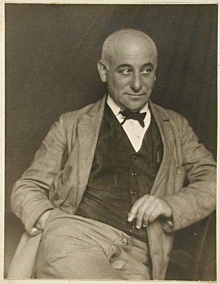
Max Jacob
(1876 – 1944)
Flagellation, Etc
« Vous avez promené le jet entre
Mes
Côtes « de la lampe à souder, le fouet des démons ! »
Aïe ! oh ! oh! le sang lent ; l’Esprit est sur la motte.
Sang à la cloque : il coule !
la cloque et les ampoules !
Qui ?
Le dieu architecte, l’ingénieur, l’ingénieur !
Hors des apparences, derrière le grillage.
Son Œil pense le sous-sol est tout ce qui fait vivre l’essence or sous le fouet le
Triste-Sire percé comme une poêle à frire pense l’espace et ce qui passe.
Vous avez promené la lampe des démons
Aïe, oh ! oh ! la faulx sur le corps de satin, la faulx qui n’est pas loin des jambes.
La fleur s’inclina sous le fouet de la lampe.
Qui ? l’inventeur des lois, aïe ! oh ! oh !
Lois du monde derrière la mer, et l’air créé ; derrière les ondes. «
Donner
Mon sang d’engrais d’esprit à vous, les bêtes, « sous la poutre et tomber aux brancards d’une charrette. «
Sang au pavé, le bois aux ressauts du pavé ! »
Fin de mort ! on est arrivé !
Mains clouées ! laissez faire : c’est pour l’humanité.
Crevez la peau, le muscle et séparez les os.
Crevez le pied, les pieds : c’est pour la vérité.
Le bois l’auguste bois percé par la ferraille. «
Je suis le dieu des dieux, l’odorante aubépine. «
Regardez-moi les yeux, je parle de partout. »
Max Jacob poetry
fleursdumal.nl magazine
More in: Archive I-J, Jacob, Max

Abraham Cowley
(1618-1667)
Against Hope
Hope, whose weak Being ruin’d is,
Alike if it succeed, and if it miss;
Whom Good or Ill does equally confound,
And both the Horns of Fates Dilemma wound.
Vain shadow! which dost vanish quite,
Both at full Noon, and perfect Night!
The Stars have not a possibility
Of blessing Thee;
If things then from their End we happy call,
’Tis Hope is the most Hopeless thing of all.
Hope, thou bold Taster of Delight,
Who whilst thou shouldst but tast, devour’st it quite!
Thou bringst us an Estate, yet leav’st us Poor,
By clogging it with Legacies before!
The Joys which we entire should wed,
Come deflowr’d Virgins to our bed;
Good fortunes without gain imported be,
Such mighty Custom’s paid to Thee.
For Joy, like Wine, kept close does better tast;
If it take air before, its spirits wast.
Hope, Fortunes cheating Lottery!
Where for one prize an hundred blanks there be;
Fond Archer, Hope, who tak’st thy aim so far,
That still or short, or wide thine arrows are!
Thin, empty Cloud, which th’eye deceives
With shapes that our own Fancy gives!
A Cloud, which gilt and painted now appears,
But must drop presently in tears!
When thy false beams o’re Reasons light prevail,
By Ignes fatui for North-Stars we sail.
Brother of Fear, more gaily clad!
The merr’ier Fool o’th’ two, yet quite as Mad:
Sire of Repentance, Child of fond Desire!
That blow’st the Chymicks, and the Lovers fire!
Leading them still insensibly’on
By the strange witchcraft of Anon!
By Thee the one does changing Nature through
Her endless Labyrinths pursue,
And th’ other chases Woman, whilst She goes
More ways and turns than hunted Nature knows.
Abraham Cowley poetry
fleursdumal.nl
More in: Archive C-D, CLASSIC POETRY
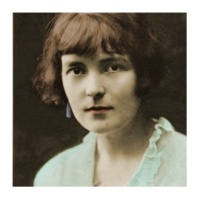 Spring Pictures
Spring Pictures
by Katherine Mansfield
I
It is raining. Big soft drops splash on the people’s hands and cheeks; immense warm drops like melted stars. “Here are roses! Here are lilies! Here are violets!” caws the old hag in the gutter. But the lilies, bunched together in a frill of green, look more like faded cauliflowers. Up and down she drags the creaking barrow. A bad, sickly smell comes from it. Nobody wants to buy. You must walk in the middle of the road, for there is no room on the pavement. Every single shop brims over; every shop shows a tattered frill of soiled lace and dirty ribbon to charm and entice you. There are tables set out with toy cannons and soldiers and Zeppelins and photograph frames complete with ogling beauties. There are immense baskets of yellow straw hats piled up like pyramids of pastry, and strings of coloured boots and shoes so small that nobody could wear them. One shop is full of little squares of mackintosh, page 185 blue ones for girls and pink ones for boys with Bébé printed in the middle of each …
“Here are lilies! Here are roses! Here are pretty violets!” warbles the old hag, bumping into another barrow. But this barrow is still. It is heaped with lettuces. Its owner, a fat old woman, sprawls across, fast asleep, her nose in the lettuce roots … Who is ever going to buy anything here …? The sellers are women. They sit on little canvas stools, dreamy and vacant looking. Now and again one of them gets up and takes a feather duster, like a smoky torch, and flicks it over a thing or two and then sits down again. Even the old man in tangerine spectacles with a balloon of a belly, who turns the revolving stand of ‘comic’ postcards round and round cannot decide …
Suddenly, from the empty shop at the corner a piano strikes up, and a violin and flute join in. The windows of the shop are scrawled over—New Songs. First Floor. Entrance Free. But the windows of the first floor being open, nobody bothers to go up. They hang about grinning as the harsh voices float out into the warm rainy air. At the doorway there stands a lean man in a pair of burst carpet slippers. He has stuck a feather through the broken rim of his hat; with what an air he wears it! The feather is magnificent. It is gold epaulettes, frogged coat, page 186 white kid gloves, gilded cane. He swaggers under it and the voice rolls off his chest, rich and ample.
“Come up! Come up! Here are the new songs! Each singer is an artiste of European reputation. The orchestra is famous and second to none. You can stay as long as you like. It is the chance of a lifetime, and once missed never to return!” But nobody moves. Why should they? They know all about those girls—those famous artistes. One is dressed in cream cashmere and one in blue. Both have dark crimped hair and a pink rose pinned over the ear … They know all about the pianist’s button boots—the left foot—the pedal foot—burst over the bunion on his big toe. The violinist’s bitten nails, the long, far too long cuffs of the flute player—all these things are as old as the new songs.
For a long time the music goes on and the proud voice thunders. Then somebody calls down the stairs and the showman, still with his grand air, disappears. The voices cease. The piano, the violin and the flute dribble into quiet. Only the lace curtain gives a wavy sign of life from the first floor.
It is raining still; it is getting dusky … Here are roses! Here are lilies! Who will buy my violets? …
II
Hope! You misery—you sentimental, faded female! Break your last string and have done with it. I shall go mad with your endless thrumming; my heart throbs to it and every little pulse beats in time. It is morning. I lie in the empty bed—the huge bed big as a field and as cold and unsheltered. Through the shutters the sunlight comes up from the river and flows over the ceiling in trembling waves. I hear from outside a hammer tapping, and far below in the house a door swings open and shuts. Is this my room? Are those my clothes folded over an armchair? Under the pillow, sign and symbol of a lonely woman, ticks my watch. The bell jangles. Ah! At last! I leap out of bed and run to the door. Play faster—faster—Hope!
“Your milk, Mademoiselle,” says the concierge, gazing at me severely.
“Ah, thank you,” I cry, gaily swinging the milk bottle. “No letters for me?”
“Nothing, mademoiselle.”
“But the postman—he has called already?”
“A long half-hour ago, mademoiselle.”
Shut the door. Stand in the little passage a moment. Listen—listen for her hated twanging. Coax her—court her—implore her to play just once that charming little thing for one string only. In vain.
III
Across the river, on the narrow stone path that fringes the bank, a woman is walking. She came down the steps from the Quay, walking slowly, one hand on her hip. It is a beautiful evening; the sky is the colour of lilac and the river of violet leaves. There are big bright trees along the path full of trembling light, and the boats, dancing up and down, send heavy curls of foam rippling almost to her feet. Now she has stopped. Now she has turned suddenly. She is leaning up against a tree, her hands over her face; she is crying. And now she is walking up and down wringing her hands. Again she leans against the tree, her back against it, her head raised and her hands clasped as though she leaned against someone dear. Round her shoulders she wears a little grey shawl; she covers her face with the ends of it and rocks to and fro.
But one cannot cry for ever, so at last she becomes serious and quiet, patting her hair into place, smoothing her apron. She walks a step or two. No, too soon, too soon! Again her arms fly up—she runs back—again she is blotted against the tall tree. Squares of gold light show in the houses; the street lamps gleam through the new leaves; yellow fans of light follow the dancing boats. For a moment she is a blur against the tree, white, grey and black, melting into the stones and the shadows. And then she is gone.
Spring Pictures (1915)
by Katherine Mansfield (1888 – 1923)
From: Something Childish and Other Stories
fleursdumal.nl magazine
More in: 4SEASONS#Spring, Archive M-N, Katherine Mansfield, Mansfield, Katherine
 The Tree
The Tree
by H. P. Lovecraft
“Fata viam invenient.”
On a verdant slope of Mount Maenalus, in Arcadia, there stands an olive grove about the ruins of a villa. Close by is a tomb, once beautiful with the sublimest sculptures, but now fallen into as great decay as the house. At one end of that tomb, its curious roots displacing the time-stained blocks of Pentelic marble, grows an unnaturally large olive tree of oddly repellent shape; so like to some grotesque man, or death-distorted body of a man, that the country folk fear to pass it at night when the moon shines faintly through the crooked boughs. Mount Maenalus is a chosen haunt of dreaded Pan, whose queer companions are many, and simple swains believe that the tree must have some hideous kinship to these weird Panisci; but an old bee-keeper who lives in the neighbouring cottage told me a different story.
Many years ago, when the hillside villa was new and resplendent, there dwelt within it the two sculptors Kalos and Musides. From Lydia to Neapolis the beauty of their work was praised, and none dared say that the one excelled the other in skill. The Hermes of Kalos stood in a marble shrine in Corinth, and the Pallas of Musides surmounted a pillar in Athens, near the Parthenon. All men paid homage to Kalos and Musides, and marvelled that no shadow of artistic jealousy cooled the warmth of their brotherly friendship.
But though Kalos and Musides dwelt in unbroken harmony, their natures were not alike. Whilst Musides revelled by night amidst the urban gaieties of Tegea, Kalos would remain at home; stealing away from the sight of his slaves into the cool recesses of the olive grove. There he would meditate upon the visions that filled his mind, and there devise the forms of beauty which later became immortal in breathing marble. Idle folk, indeed, said that Kalos conversed with the spirits of the grove, and that his statues were but images of the fauns and dryads he met there—for he patterned his work after no living model.
So famous were Kalos and Musides, that none wondered when the Tyrant of Syracuse sent to them deputies to speak of the costly statue of Tyché which he had planned for his city. Of great size and cunning workmanship must the statue be, for it was to form a wonder of nations and a goal of travellers. Exalted beyond thought would be he whose work should gain acceptance, and for this honour Kalos and Musides were invited to compete. Their brotherly love was well known, and the crafty Tyrant surmised that each, instead of concealing his work from the other, would offer aid and advice; this charity producing two images of unheard-of beauty, the lovelier of which would eclipse even the dreams of poets.
With joy the sculptors hailed the Tyrant’s offer, so that in the days that followed their slaves heard the ceaseless blows of chisels. Not from each other did Kalos and Musides conceal their work, but the sight was for them alone. Saving theirs, no eyes beheld the two divine figures released by skilful blows from the rough blocks that had imprisoned them since the world began.
At night, as of yore, Musides sought the banquet halls of Tegea whilst Kalos wandered alone in the olive grove. But as time passed, men observed a want of gaiety in the once sparkling Musides. It was strange, they said amongst themselves, that depression should thus seize one with so great a chance to win art’s loftiest reward. Many months passed, yet in the sour face of Musides came nothing of the sharp expectancy which the situation should arouse.
Then one day Musides spoke of the illness of Kalos, after which none marvelled again at his sadness, since the sculptors’ attachment was known to be deep and sacred. Subsequently many went to visit Kalos, and indeed noticed the pallor of his face; but there was about him a happy serenity which made his glance more magical than the glance of Musides—who was clearly distracted with anxiety, and who pushed aside all the slaves in his eagerness to feed and wait upon his friend with his own hands. Hidden behind heavy curtains stood the two unfinished figures of Tyché, little touched of late by the sick man and his faithful attendant.
As Kalos grew inexplicably weaker and weaker despite the ministrations of puzzled physicians and of his assiduous friend, he desired to be carried often to the grove which he so loved. There he would ask to be left alone, as if wishing to speak with unseen things. Musides ever granted his requests, though his eyes filled with visible tears at the thought that Kalos should care more for the fauns and the dryads than for him. At last the end drew near, and Kalos discoursed of things beyond this life. Musides, weeping, promised him a sepulchre more lovely than the tomb of Mausolus; but Kalos bade him speak no more of marble glories. Only one wish now haunted the mind of the dying man; that twigs from certain olive trees in the grove be buried by his resting-place—close to his head. And one night, sitting alone in the darkness of the olive grove, Kalos died.
Beautiful beyond words was the marble sepulchre which stricken Musides carved for his beloved friend. None but Kalos himself could have fashioned such bas-reliefs, wherein were displayed all the splendours of Elysium. Nor did Musides fail to bury close to Kalos’ head the olive twigs from the grove.
As the first violence of Musides’ grief gave place to resignation, he laboured with diligence upon his figure of Tyché. All honour was now his, since the Tyrant of Syracuse would have the work of none save him or Kalos. His task proved a vent for his emotion, and he toiled more steadily each day, shunning the gaieties he once had relished. Meanwhile his evenings were spent beside the tomb of his friend, where a young olive tree had sprung up near the sleeper’s head. So swift was the growth of this tree, and so strange was its form, that all who beheld it exclaimed in surprise; and Musides seemed at once fascinated and repelled.
Three years after the death of Kalos, Musides despatched a messenger to the Tyrant, and it was whispered in the agora at Tegea that the mighty statue was finished. By this time the tree by the tomb had attained amazing proportions, exceeding all other trees of its kind, and sending out a singularly heavy branch above the apartment in which Musides laboured. As many visitors came to view the prodigious tree, as to admire the art of the sculptor, so that Musides was seldom alone. But he did not mind his multitude of guests; indeed, he seemed to dread being alone now that his absorbing work was done. The bleak mountain wind, sighing through the olive grove and the tomb-tree, had an uncanny way of forming vaguely articulate sounds.
The sky was dark on the evening that the Tyrant’s emissaries came to Tegea. It was definitely known that they had come to bear away the great image of Tyché and bring eternal honour to Musides, so their reception by the proxenoi was of great warmth. As the night wore on, a violent storm of wind broke over the crest of Maenalus, and the men from far Syracuse were glad that they rested snugly in the town. They talked of their illustrious Tyrant, and of the splendour of his capital; and exulted in the glory of the statue which Musides had wrought for him. And then the men of Tegea spoke of the goodness of Musides, and of his heavy grief for his friend; and how not even the coming laurels of art could console him in the absence of Kalos, who might have worn those laurels instead. Of the tree which grew by the tomb, near the head of Kalos, they also spoke. The wind shrieked more horribly, and both the Syracusans and the Arcadians prayed to Aiolos.
In the sunshine of the morning the proxenoi led the Tyrant’s messengers up the slope to the abode of the sculptor, but the night-wind had done strange things. Slaves’ cries ascended from a scene of desolation, and no more amidst the olive grove rose the gleaming colonnades of that vast hall wherein Musides had dreamed and toiled. Lone and shaken mourned the humble courts and the lower walls, for upon the sumptuous greater peristyle had fallen squarely the heavy overhanging bough of the strange new tree, reducing the stately poem in marble with odd completeness to a mound of unsightly ruins. Strangers and Tegeans stood aghast, looking from the wreckage to the great, sinister tree whose aspect was so weirdly human and whose roots reached so queerly into the sculptured sepulchre of Kalos. And their fear and dismay increased when they searched the fallen apartment; for of the gentle Musides, and of the marvellously fashioned image of Tyché, no trace could be discovered. Amidst such stupendous ruin only chaos dwelt, and the representatives of two cities left disappointed; Syracusans that they had no statue to bear home, Tegeans that they had no artist to crown. However, the Syracusans obtained after a while a very splendid statue in Athens, and the Tegeans consoled themselves by erecting in the agora a marble temple commemorating the gifts, virtues, and brotherly piety of Musides.
But the olive grove still stands, as does the tree growing out of the tomb of Kalos, and the old bee-keeper told me that sometimes the boughs whisper to one another in the night-wind, saying over and over again, “Οἶδα! Οἶδα!—I know! I know!”
The Tree (1920)
by H. P. Lovecraft (1890 – 1937)
fleursdumal.nl magazine
More in: Archive K-L, Lovecraft, H.P., Tales of Mystery & Imagination
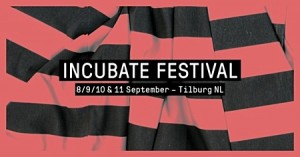
Incubate is the annual celebration of cutting-edge culture. It is a festival exhibiting a diverse view on indie culture as a whole, including music, visual arts, film and contemporary theater, and a conference. For the upcoming May edition it brings more than 70 cutting edge artists in an intimate context to an international audience. Black metal next to free jazz. Refresh art next to inspiring debate.
# Incubate Festival
# 8/9/10/11 September 2016, TILBURG (NL)
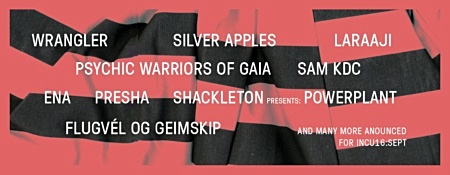
33 artists: Deerhoof – Yob – Psychic Warriors of Gaia – SHACKLETON presents: POWERPLANT – Ramesses – Wrangler – Nothing – Silver Apples – Laraaji – Black Cobra – Cult of Dom Keller – Pop. 1280 – Sam KDC – Kayo Dot – Mutilation Rites – DJ. Flugvél og Geimskip – Presha – Ena – La Hell Gang – Vitamin X – Aidan Baker & Tomas Järmyr – Employed to Serve – Mathieu Serruys – Wiegedood – Otto Lindholm – Orphax – BJ Nilsen – Edgars Rubenis – TVO – Zeno van den Broek – Microseq – Tasos Stamou – Adolf Butler
fleursdumal.nl magazine
More in: Art & Literature News, DANCE & PERFORMANCE, MUSIC, The talk of the town, THEATRE

William Shakespeare
(1564-1616)
A glooming peace
“A glooming peace this morning with it brings;
The sun, for sorrow, will not show his head:
Go hence, to have more talk of these sad things;
Some shall be pardon’d, and some punished:
For never was a story of more woe
Than this of Juliet and her Romeo.”
William Shakespeare, Romeo and Juliet
Shakespeare 400 (1616 – 2016)
fleursdumal.nl magazine
More in: Archive S-T, Shakespeare, William
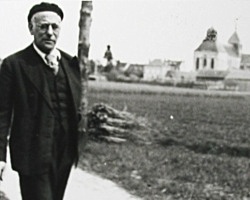
Max Jacob
(1876 – 1944)
Place Pigalle
De meilleurs démons ont fait craquer les pierres. Les balcons sont égayés par l’écarlate : les fez. J’ai étendu mon manteau rouge au-dessus de vos têtes et vous vous êtes tus. Il y avait à une table en plein air, où des dames blanches disaient : « Il prend notre statuette l’une après l’autre et essaie de la briser, le dédaigneux ». Le sommelier du café, qui a de la sciure de bois dans ses rides, fait des commandes désordonnées au représentant de Bercy et le patron n’est pas très satisfait. Qu’importe ! On laisse sur le marbre des bouteilles de kummel dans les mains de vieux célibataires rancis : et ils versent à la ronde. Les chevelures de mes amis ont des mèches blondes et les plus pâles s’empourprent derrière le monocle ou les lunettes. Tout est de la couleur des aurores royales ou de celle du crépuscule souverain.
Rien n’a plus d’autre prix que celui d’une joie magique.
Max Jacob poetry
fleursdumal.nl magazine
More in: Archive I-J, Jacob, Max

We need to Talk, Dream, See, Listen, Create, Upcycle, Eat & Drink, Dance, Love, Enjoy . . .
In augustus en september neemt creatief platform voor sociale verandering Beauty without Irony de eerste verdieping en de kasteeltuinen van Kasteel Sterckshof over en presenteert er een groot aantal kunstenaars die u zullen verrassen met workshops, expos, installaties optredens en ander moois, waarbij u ook zelf desgewenst de handen uit de mouwen kunt steken, om zo uw eigen bijdrage te leveren aan het maken van een mooiere wereld. BWI wil focussen op wat ons verbindt (met de nadruk op pure schoonheid), niet op dat wat ons nog wat verder uiteen drijft. Samen zijn we zoveel sterker dan alleen.
Beauty Overdose
Kasteel Sterckshof – Antwerpen
30 juli- 25 september 2016
 Beauty Overdose by BWI
Beauty Overdose by BWI
Met werken over pure schoonheid van oude en nieuwe liefhebbers van het BWI concept, uit zowel binnen- als buitenland. De volgende kunstenaars nemen deel aan Beauty Overdose: Mick Traen, Faryda Moumouh (fotografie), Emerald Rose Whipple (schilderijen), Dino Dinco (foto), Little Sun by Olafur Eliasson (installatie), Anne-Mie van Kerckhoven (schilderijen), Felix Richter (fotografie), Mark Titchner (banner), Jarno Kettunen (tekeningen), Dominik Gigler (fotografie), Javier Barcala (fotografie), Thomas Vanhaute (fotografie), Jef Paepen (fotografies), Chris Plytas (fotografie), Ben Deckers (schilderijen), Serge Vereecken (etsen), Oskar Lindholm (fotografie), Christopher Lee Sauvé (grafiek), Valérie Servant (fotografie), Hannah Rouffa (fotografie), Pascal Heymans (fotografie), Thierry Van Biesen (fotografie), Adam Munro (fotografie), Charlie De Keersmaecker (fotografie), Jean Claude Wouters (fotografie), Layla Aerts (fotografie), Anina Net (fashion, LED dresses, workshop), Jan Van Santvliet (fotografie), Mariët Hylkema (schilderijen), Jessica Antola (fotografie), Ben Van Alboom (fotografie), Kristof Van Heeschvelde (schilderijen), Vincent Gagliostro (fotografie), WallDog (fotografie & video) …
Binnen Beauty Overdose vinden er ook verschillende deelprojecten, workshops en concerten plaats in Sterckshof. Hier een overzicht.
BWI Art Vlaggen
Met: Javier Barcala, Nick Hannes, Felix Richter, Titus Simoens, Mick Traen, Thierry Van Biesen …

Wall of Beauty
Voor deze wall wordt vertrokken vanuit de allermooiste beelden uit het eerste BWI-boek en daarna wordt het alleen maar beter – neem je prachtigste foto’s (op A4-formaat) mee en maak het geheel zelf nog mooier!
Met: Antonio Paladino & Serkan Sarier, Christopher Lee Sauvé, OKAR (Oskar Lindholm), Elke Boon, Lars Stephan, Filip Van Roe, Diego Franssens, Filip Naudts, Tom Tosseyn, Jimmy Kets, Peggy Sirota, Glenn Glasser, Ellie Van Den Brande, Valérie Servant…
Robotic Dress & Motion Dress by 360Fash Tech Kits (30/7 – 4/8)
Anina Net is CEO van 360Fashion Technology Network en experte in smart clothing en accessories gemaakt met behulp van haar 360 Fash Tech Kits, speciaal gemaakt voor ontwerpers en andere creatievelingen die niet zo handig zijn met coding en met de LED Ribbon, een flexibele band van satijn met micro led-lampjes en geconnecteerde bedrading dat vrijwel onzichtbaar in bijvoorbeeld kleding en handtassen verwerkt kan worden
Op ‘Beauty Overdose’ zal Anina Net haar ‘Robotic Dress’ tonen, die werd ontworpen door Michal Starost en de ‘Motion Dress’, gemaakt door modelabel R Factory. Daarnaast toont Anina ook enkel ehandtassen van LIBET waarin de LED Ribbon werd verwerkt.
Sociaal-artistiek project met foto’s van Adam Munro en interviews door Ninette Murk, waarbij bewoners van de Grapheusstraat in Deurne–Dorp (300 meter van kasteel Sterckshof gelegen) vertellen wat zij het allermooiste vinden in hun straat.
Workshops en optredens
Art-Tea high teas & dinners
Repair Café
Tai chi workshops & fotografie expo (Jan Van Santvliet)
Role Play Group
Burlesque group (Ayke)
Hip hop workshops (Kris Strybos / Scale)
Voice coaching
Morning dew walks
Plus wekelijks gratis live muziek optredens in Bar Stark (bij goed weer buiten).
Op www.beautywithoutirony.com vindt u een overzicht van het programma.
Over Beauty without Irony
Creatief platform voor sociale verandering Beauty without Irony (BWI-2001), isvooral bekend is geworden met hun eerste project Designers against AIDS (DAA- 2004), waarvoor werd samengewerkt met zowat alle Belgische en veel internationale ontwerpers en bedrijven zoals H&M, Marc Jacobs, Playboy Design, Delvaux, Eastpak, Essentiel en JBC. BWI is ook de motor van het ‘Youth For A Better World Center’ in Deurne (2010) waar het team samen met Belgische en internationale studenten uit creative disciplines werkt aan nieuwe campagnes rond sociale themas die interessant en belangrijk zijn voor jongeren. Zowel BWI als DAA gebruiken elementen uit de pop cultuur om te werken rond thema’s zoals HIV preventie, echte schoonheid, zelfvertrouwen bij jonge vrouwen en ecologie en zij doen dat voornamelijk online, met af en toe een event of project IRL, zoals momenteel de expositie Beauty Overdose.
Concept: Ninette Murk, Kim Kindermans, Peter Gubbels
www.beautywithoutirony.com
Beauty Overdose is vanaf 30 juli tot en met 25 september elke zaterdag en zondag tussen 14 en 18 u gratis te bezichtigen.
Adres: Kasteel Sterckshof, Hooftvunderlei 160 (ingang via Cornelissenlaan 10), 2100 Deurne (Nabij Antwerpen BE).
fleursdumal.nl magazine
More in: Art & Literature News, AUDIO, CINEMA, RADIO & TV, DANCE & PERFORMANCE, DICTIONARY OF IDEAS, Exhibition Archive, Photography, THEATRE
Thank you for reading Fleurs du Mal - magazine for art & literature